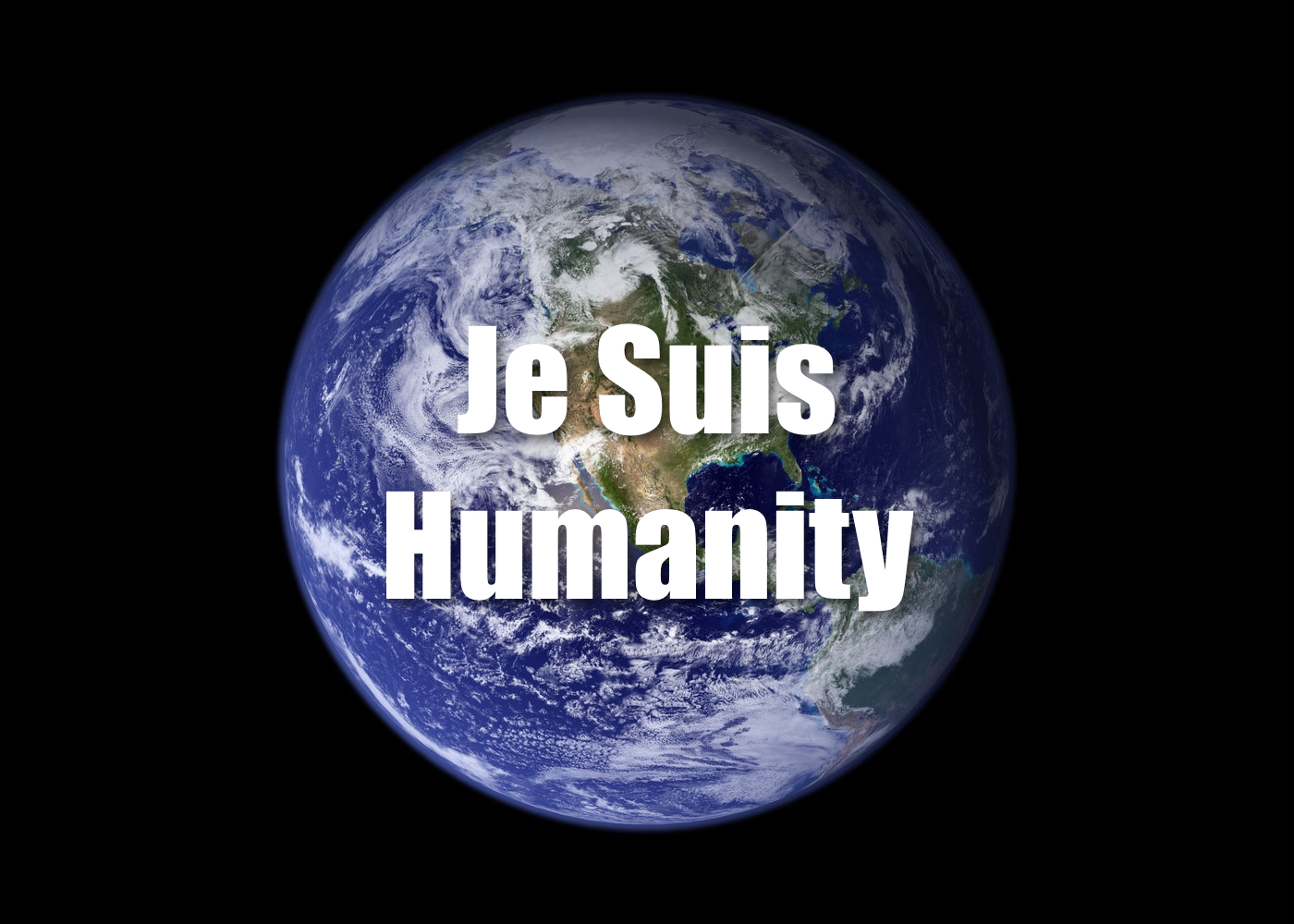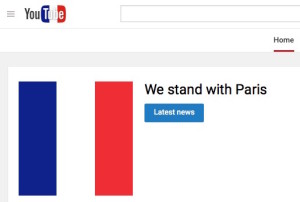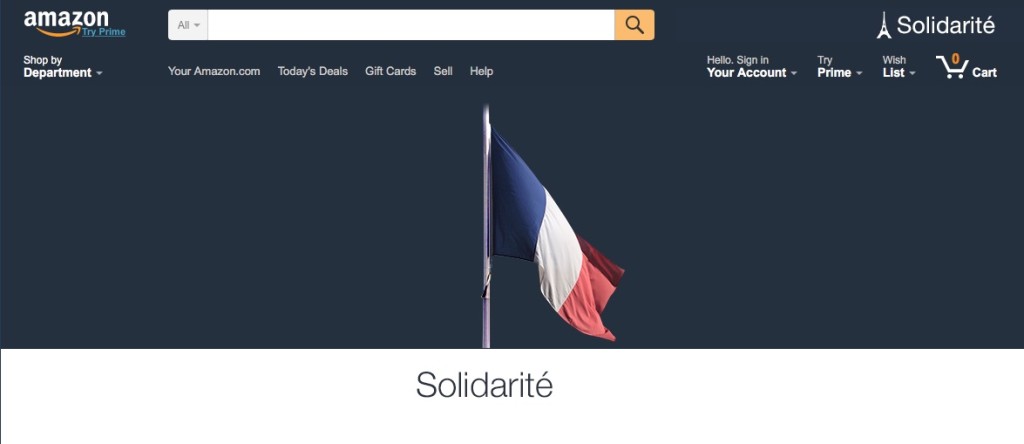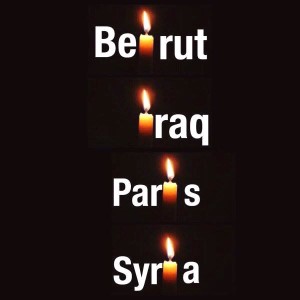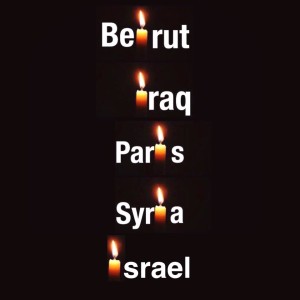Friday evening a notification appeared on my phone. It was from Facebook telling me that my friend in Paris was okay. I’d not heard any news of the Paris attack prior to that Facebook message. I immediately went to the news and started reading the mixed reports that began to surface moments after the tragedy there. Other friends of mine in Paris began using the Facebook Safety Check app for the Paris Terror Attacks. One friend I heard from by email — we’d been visiting in Iowa City last week prior to their trip to France.
In a short while, I began seeing profile pictures of various people from around the world with a flag of France superimposed. There was an invitation to use the Facebook app and convert my profile pic to have the French flag.
NPR published a dramatic series of photos depicting crowds of people around the world standing in solidarity with France: The World Responds To The Paris Attacks — From Brazil to Iran, from Sweden to Ramallah, here are 33 images of the world reaction.
The YouTube profile picture incorporated the French flag, and news about France was featured at the top of the page — at least it was for about 24 hours until supporting France at the exclusion of other countries became unpopular. As of Monday, YouTube has removed their “We stand with Paris” statement and the France-friendly modified logo has been removed.
Amazon has dedicated their home page to a message of solidarity with the people of Paris and France.
There were echoes of the Charlie Hedbo tragedy and the Je suis Charlie meme reemerging as Je suis Paris.
The group known as Anonymous vowed to go after ISIS by attacking their technology infrastructure.
The organization Hezbollah has announced they will join in the fight against ISIS.
It nice to see a world-wide response of unity and solidarity with France. It’s not surprising to see such an outpouring of support since many people around the world have connections with Paris, not just through friends and family, but also through literature and cinema that has served to create a feeling of familiarity with the city among people who have never been there.
A friend of mine in New York shared this experience on Facebook:
“I just saw a woman on the subway, standing and quietly crying by herself. Nobody seemed to care, so I walked over and asked if everything was ok. She looked at me and said something in French. I started crying too…”
Inclusive Compassion
Like most people, I’m sorrowful when hearing news of natural disasters and other tragedies anywhere in the world and more so when people I know are involved. It’s human nature to be more emotionally involved when people we know are harmed.
Yet, being mindful of the ISIS attack in Beirut, and harm being done elsewhere, I wanted to post a picture that would convey sorrow about the tragedy in France, but also acknowledge the harm being done by extremism elsewhere. So, I re-posted this picture that I’d seen on Facebook:
Minutes later, multiple friends of mine independently asked this question: “Why is Israel missing from that list?”
I explained that it wasn’t intentional. I’d simply reposted an image that seemed to convey a broader acknowledgement of recent sorrow caused by terrorism and war around the world.
Yet, their question caused me to think about why Israel might be intentionally left out given the October increase in fatalities there (compared to previous months). I think in part, there’s less concern about Israel because the dominant narrative about the Israel-Palestine conflict (right or wrong) portrays Israel as a well funded militant police-state oppressor, occupier, land-grabber, and instigator of violence. So, when tragedy strikes Israel, it’s perceived (by some) to be ‘deserved retaliation for all the bad they are doing.’ I don’t agree with that narrative, but it’s the viewpoint that seems to be dominant among the people I know and the media I’m exposed to.
Even so, I decided to add Israel to the graphic:
A short while later, someone posted what they called a ‘more balanced’ alternative version of the image — with Israel not present, but Palestine added as well as Libya, Afghanistan, and Yemen.

That person was criticized for not including Kenya and Turkey in his graphic. I decided to ‘let it go’ and not respond with an even longer more inclusive graphic.
I didn’t want to join with the ‘one-upmanship‘ of others who were trying to create the meme that would rise to the top in popularity and define the latest tragedy
There were already people using the tragedy for self promotion or personal causes, and one author trying to sell copies of his book that blames the Paris attacks on Israel and the Jews.
People Showing Greater Concern for Paris Isn’t Racism
I began seeing posts on Facebook and articles on websites that suggested those showing concern about Paris, while seemingly ignoring the bombings in Beirut, were racist in their selective compassion.
“What drives our selective outrage if not selective compassion?” (Source: Jonathan Cook, 14 November 2015)
The suggestion is that we’re racist in our selective compassion that only extends to white people.
In an article by someone else, the author stated:
“Meanwhile, in a brown part of the world, as the attacks began in Paris, Lebanon was just emerging from a National Day of Mourning, after 43 people were killed and 200 more were injured during a series of coordinated suicide bombings in Beirut.” (Source: NewMatilda.com, 14 November 2015)
Trying to portray Paris as ‘white’ and Lebanon as ‘brown’ oversimplifies the global response to the terror attacks in Paris. Indeed, of the four people I know who were in Paris during the attacks, three of them were not white. It’s racist for the author above to assume that everyone in France is white and everyone in Lebanon is ‘brown.’
People naturally feel a greater concern for those they know or identify with. It’s not an evil or selfish trait, nor is it racist. For the same reason, after terrorist attacks (like 9/11), some people mourn while elsewhere in the world people are in the streets celebrating, dancing, and burning effigies of western leaders. It’s about alliances rather than skin color.
Whenever a news story breaks, there are people on all sides who claim that the media favored one group over another. Below is the front page Monday morning news following the past few days of events. This is from a prominent North American university which makes no mention of the bombings in Beirut or the attacks in Paris. Apparently football seems to be on the mind of many people this past weekend.
Finding Solutions
The real crux of this issue is that we need to have more global alliances among people of differing backgrounds, economic means, and viewpoints.
Rather than criticizing and demanding that people have a high degree of emotional connection with those they’ve never met, we should encourage and foster cross-cultural relationships, so that when tragedy strikes anywhere in the world, it will be felt by everyone in the world.
Cross cultural friendships help us have greater compassion, and they also help prevent misunderstanding, terrorism, and war.
